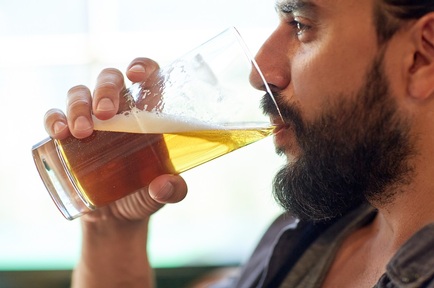Drinking alcohol linked to over 740,000 new cancer cases in 2020
Some 740,000 newly diagnosed cancer cases across the world in 2020 have been linked to drinking alcohol, with the Covid pandemic having increased consumption, according to a global study.

Risky and heavy drinking was estimated to contribute the highest number of cancer cases last year, but moderate drinking – the equivalent of around two daily drinks – led to more than 103,000 cases, according to research published in The Lancet Oncology.
Large number of new oesophagus, liver and breast cancer cases
Cancers of the oesophagus (189,700 cases), liver (154,700 cases), and breast (98,300 cases) accounted for the largest number of new cases, followed by colorectal cancers and cancers of the mouth and throat. It is estimated that in 2020, there were more than 6.3 million cases of mouth, pharynx, voice box (larynx), oesophageal, colon, rectum, liver, and breast cancer.
Researchers, which included academics at the International Agency for Research on Cancer (IARC), said disruptions to health care and cancer services across the world due to the COVID-19 pandemic are likely to have affected diagnosis rates for 2020 and may have led to an underestimation of new cancer cases in the recorded data.
Cancer treatment backlog
NHS England has said it will clear the backlog of patients waiting for cancer treatment caused by the pandemic by March 2022. It estimates 36,000 people did not come forward for early diagnosis last year.
Dame Cally Palmer, national cancer director for NHS England, told the Health and Social Care committee of MPs on 13 July that people had not wanted to take up NHS staff's time last year but referrals and treatments have been above normal levels since March 2021.
There was also a fall in the number of people approaching their GP about lung cancer because of the overlap between lung cancer symptoms and Covid-19.
The backlog has meant around 16,000 people are currently waiting more than 62 days for a diagnosis, of which 12 per cent will have cancer.
Increased rates of drinking
"There is evidence that the COVID-19 pandemic has increased rates of drinking in some countries" said Harriet Rumgay of the IARC, which took part in the global study.
"Our study highlights the contribution of even relatively low levels of drinking to rates of cancer, which is concerning, but also suggests that small changes to public drinking behaviour could positively impact future cancer rates.
“We urgently need to raise awareness about the link between alcohol consumption and cancer risk among policy makers and the general public."
The study revealed men account for more than three quarters of all alcohol-linked cancer cases (77 per cent) – equivalent to 568,700 cases when compared to women (23 per cent) or 172,600 cases.
Across the world: - The UK had an estimated four per cent of cancer cases linked to alcohol (16,800).
- China six per cent (282,300).
- India five per cent (62,100).
- France five per cent (20,000 cases).
- Germany four per cent (21,500 cases).
- Brazil four per cent (20,500 cases).
- United States three per cent (52,700).
Harriet Rumgay added: “Public health strategies, such as reduced alcohol availability, labelling alcohol products with a health warning, and marketing bans could reduce rates of alcohol-driven cancer.
“Tax and pricing policies that have led to decreased alcohol intake in Europe, including increased excise taxes and minimum unit pricing, could also be implemented in other world regions.
“Trends suggest that although there is a decrease in alcohol consumption per person in many European countries, alcohol use is on the rise in Asian countries such as China and India, and in sub-Saharan Africa."
In the study, researchers established levels of alcohol intake per person per country for 2010 (to allow for the time it takes for alcohol intake to affect possible cancer development) then combined them with estimated new cancer cases in 2020 (for the cancer types with the strongest evidence of a causal link to alcohol in their main analyses).
The global study was conducted by researchers from across the world including the Centre for Research and Information on Substance Abuse in Nigeria, the American Cancer Society in US, the Netherlands Comprehensive Cancer Organisation in the Netherlands, the Sechenov First Moscow State Medical University in Russia and Germany's Technische Universität Dresden.
Latest News
 29-Jul-24
Dementia Bus gives carehome.co.uk staff insight into life with dementia
29-Jul-24
Dementia Bus gives carehome.co.uk staff insight into life with dementia
 27-Jul-23
UK's top home care agencies in 2023 revealed
27-Jul-23
UK's top home care agencies in 2023 revealed
 30-Nov-22
A quarter of older people keep their falls secret from family
30-Nov-22
A quarter of older people keep their falls secret from family
 29-Nov-22
'Covid-19 has not gone away' say terminally ill
29-Nov-22
'Covid-19 has not gone away' say terminally ill
 28-Nov-22
IT consultant who received poor care opens 'compassionate' home care business
28-Nov-22
IT consultant who received poor care opens 'compassionate' home care business